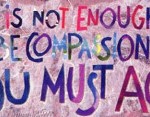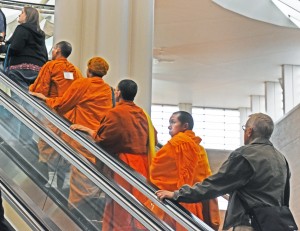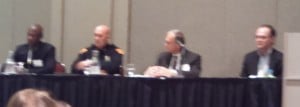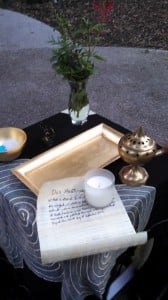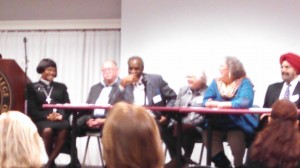 The light bulb came on for me this week.
The light bulb came on for me this week.
It was a big interfaith week for me here in South Carolina. Last Sunday Interfaith Partners held our annual meeting, at which I gave a very brief report on something Cherry Hill Seminary students are doing. Then Thursday I traveled to Aiken to meet with a fledgling group there. Yesterday I popped by the big dedication festivities for a new Hindu (BAPS) temple in my own neighborhood.
I love this stuff, love the people I meet, love the friends I’ve made. The food is great, and my international colleagues wear some clothes that this make this hippie Pagan salivate. The people who choose to come to these things treat each other with a warmth and respect that you seldom find anywhere else, because we all are so happy that in at least this one place we have equal standing.
But still I hear the “we all worship the same god by different names” stuff. I have come to understand that this is how people new to interfaith signal their intention to be accepting of others, to acknowledge that they do not have exclusive ownership of the divine. Those who stick around and pay attention may gradually come to understand the importance of acknowledging our differences. But not everyone.
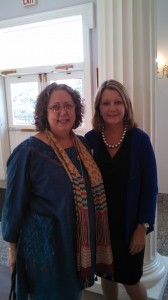 My Indian-American governor has been in India during this same week. I watched an interview with her on Indian television one day. She was perhaps the most candid that I have ever seen her, as she answered the reporter’s questions about her childhood and religious choices. Haley was raised Sikh, then joined the Methodist church as an adult. Her father was a professor in Orangeburg, and they grew up in a very rural county. Imagine being a child in the South with brown skin, a funny accent, and a father who wears a turban!
My Indian-American governor has been in India during this same week. I watched an interview with her on Indian television one day. She was perhaps the most candid that I have ever seen her, as she answered the reporter’s questions about her childhood and religious choices. Haley was raised Sikh, then joined the Methodist church as an adult. Her father was a professor in Orangeburg, and they grew up in a very rural county. Imagine being a child in the South with brown skin, a funny accent, and a father who wears a turban!
As she spoke, it finally clicked for me. The way she survived was because her parents kept repeating the message to the children, “We are all humans, we are all the same, you worship the same god as the other children at school, just with a different name.” They were trying to maintain their unique culture while simultaneously assimilating, a good trick if you can do it.
At another meeting I met a Holocaust survivor from Germany. This delightful person kept repeating that phrase, “We all worship the same god,” until I broke in to say, “But we don’t!” She looked shocked, then said, “You don’t, but we do,” gesturing to the Christian and Muslim members of the group. I just nodded and we went on, though I know from later conversation that I gave her food for thought. Again, however, I thought about how the message that we worship the same god might have saved her family’s life in the 1930s.
For these individuals and others, being perceived as the same has been a matter of life or death, prospering or failing to thrive. Everyone already saw their differences; they wanted others to see their commonalities.
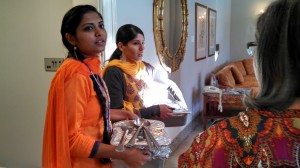 So what is my message as a Pagan to my interfaith colleagues? It is this: Yes, we are the same as human beings, but we are also different, and in the sacred space of our friendship, I honor our differences, even celebrate them, and I expect you to acknowledge them, too. Furthermore, you are safe with me. I no more think less of you for being different than I expect you to think of me. We have this privilege because we live in a democracy.
So what is my message as a Pagan to my interfaith colleagues? It is this: Yes, we are the same as human beings, but we are also different, and in the sacred space of our friendship, I honor our differences, even celebrate them, and I expect you to acknowledge them, too. Furthermore, you are safe with me. I no more think less of you for being different than I expect you to think of me. We have this privilege because we live in a democracy.
But we lose the privilege when we do not speak up. Staying in the broom closet, not finding time for an occasional interfaith visit, is for Pagans the equivalent of saying “We are all the same.” We claim a fear of discrimination, but we will never achieve equal footing with mainstream culture if we are not willing to expose the ways in which we are different.
Recently, a young witch wrote me to say “I don’t care a thing about religious tolerance.” She may be forgiven her youthful zeal for change, but she could only say that from her place of privilege in a tolerant America. Meanwhile, thousands are dying around the globe because of intolerance.
Which brings us back to the folks who say we are all the same. I can agree with them in a way – we all want to be safe, loved, and to raise our families in peace. One of the best ways I know to make that happen is through my interfaith involvement.

